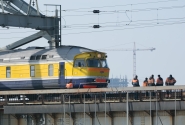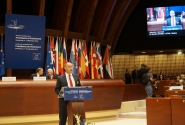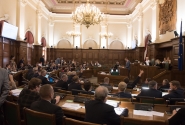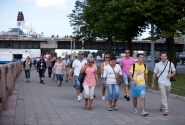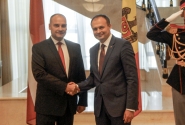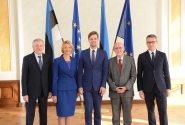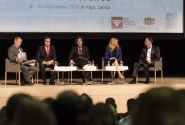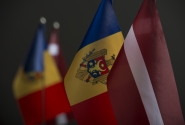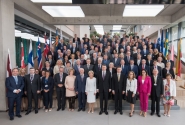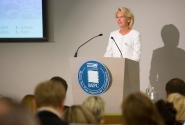On Monday, 19 September, the Chairpersons of the Committees on European Affairs of the parliaments of the Baltic States and Poland issued a joint statement supporting the Rail Baltica project and urging the responsible parties to follow closely the project deadlines significant for ensuring availability of EU financing for the Rail Baltica project.
Press releases
Gundars Daudze: European parliaments need to re-think their approach to the migration crisis (16.09.2016.)
At a discussion about the role and responsibilities of parliaments in the migration and refugee crisis in Europe in the framework of the European Summit of Presidents and Speakers of Parliament in Strasbourg, Gundars Daudze, Deputy Speaker of the Saeima, said: “European parliaments have to re-think their current approach to the migration crisis. It is the task of the national parliaments to find the middle ground, where the interests of their citizens are protected, whilst also providing as much help as possible to people fleeing actual warfare. It is important that parliaments adopt well-considered legislation precluding potential and unwanted risks; assistance should only be provided to those who truly need it, but not to people who are trying to take advantage of the situation.”
On Thursday, 15 September, the Saeima adopted in the first reading the draft law “On the Protocol to the North Atlantic Treaty on the Accession of Montenegro”, thus conceptually supporting ratification of the Protocol on Montenegro joining NATO.
On Thursday, 15 September, the Saeima adopted in the final reading amendments to the Law “On the Change of a Given Name, Surname and Nationality Record”, which aim to simplify the procedure for foreigners of Latvian origin registering their nationality.
Gundars Daudze to Moldavian Speaker: Eastern Partnership and support to Moldova remain strategic priorities for Latvia (09.09.2016.)
On Friday, 9 September, during his working visit to Moldova, Gundars Daudze, Deputy Speaker of the Saeima, met with Andrian Candu, Speaker of the parliament of Moldova. “Latvia and Moldova are engaged in an active political dialogue and constructive parliamentary cooperation. The Eastern Partnership continues to be Latvia’s strategic priority,” the Deputy Speaker of the Saeima confirmed to Andrian Candu.
On Friday, 9 September, the chairpersons of the European Affairs Committees of the parliaments of the Baltic States and Poland met in Tallinn, Estonia, where they adopted a joint statement in support of the Transatlantic Trade and Investment Partnership between the European Union (EU) and the United States of America (USA).
Inese Lībiņa-Egnere: international law played an essential role in the restoration of Latvia’s independence (09.09.2016.)
“Latvia strongly believes in international law. This belief is rooted in our experience of being able, under international law, to reinstate our statehood after 50 years of occupation,” stressed Inese Lībiņa-Egnere, Deputy Speaker of the Saeima, on Thursday, 8 September, when opening the 12th Annual Conference of the European Society of International Law (ESIL) at the Latvian National Library. This year the prominent legal forum focused on how international law works in times of crisis.
On 8–10 September Gundars Daudze, Deputy Speaker of the Saeima, is on a working visit in Moldova, where, upon the invitation of the parliament of Moldova, he is taking part in the celebration of the 25th anniversary of the independence of Moldova.
Parliamentarians of the Baltic Sea region call for closer integration of education and the labour market (30.08.2016.)
On Tuesday, 30 August, in Riga parliamentarians of the countries of the Baltic Sea region stressed the need to establish closer cooperation in education so as to integrate the education system with the labour market. The parliamentarians adopted the Resolution of the 25th Baltic Sea Parliamentary Conference (BSPC) emphasising the role of education in improving the region’s competitiveness.
On Monday, 29 August, Ināra Mūrniece, Speaker of the Saeima, called on the Baltic Sea region countries to jointly contribute to the region’s peace and democracy, which is now more vital than ever to counter the conflict threats.






